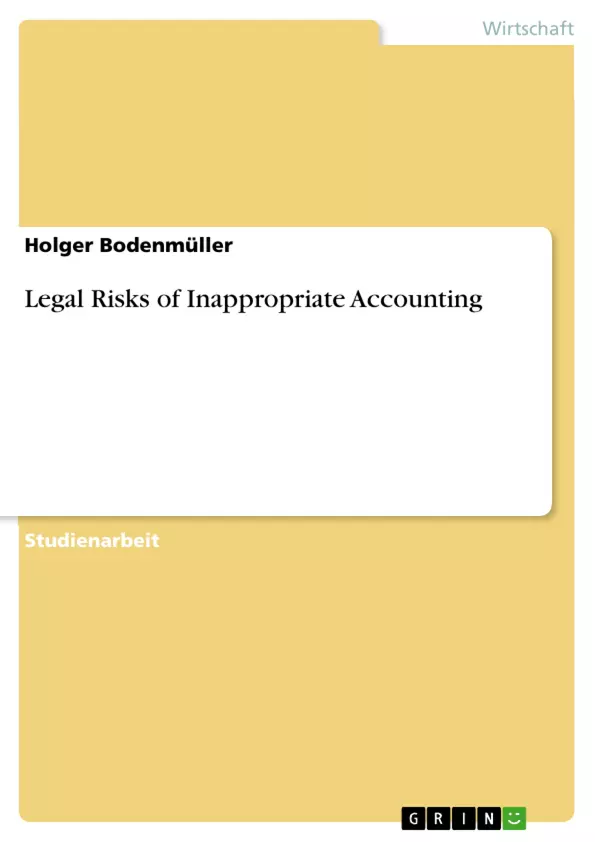Acting as a merchant in the context of a private or capital company is related to duties summarized in the Principles of Orderly Accounting. These principles comprise aspects of accounting like accuracy, transparency, completeness, traceability, timeliness, documentation and retention. Even if these principles should be understood as undefined legal concepts they can be used to interpret existing law or even become more binding if there are no clear legal regulations. The consequences of violations of bookkeeping duties are mainly regulated in the Strafgesetzbuch (StGB) and AO (Abgabenordnung). Gross negligent acting and violations can result in coercive measures, harsh fines or even imprisonment of up to two years. It is strongly recommended for a merchant running a business at a certain size to professionally care about his or her duties regarding the Principles of Orderly Accounting.
Inhaltsverzeichnis
- Executive Summary
- Table of Contents
- List of Abbreviations
- Introduction/Problem Definition
- Objectives
- Methods
- Main Part
- Accounting Obligations
- Accounting Obligations under Commercial Law
- Accounting Obligations under Fiscal Law
- Principles for Orderly Accounting (POA)
- The Principle of Accuracy, Freedom from Arbitrariness and Steadiness
- The Principle of Clarity and Transparency (Including the Principle of Individual Evaluation)
- The Principle of Completeness
- The Principles of Timeliness, Documentation of Changes and Language
- The Principle of Verifiability (Belegbarkeit und Prüfbarkeit)
- The Principle of Economic Proportionality
- Obligations of Data Retention
- Relationship between the Principles of Orderly Accounting and the Bilanzrechtsmodernisierungsgesetz (BilMoG)
- Consequences of Violations of bookkeeping duties
- Accounting Obligations
- Conclusion
- ITM Checklist
- Bibliography
Zielsetzung und Themenschwerpunkte
Der vorliegende Text befasst sich mit den rechtlichen Grundlagen der Buchführung und den Risiken, die aus einer nicht ordnungsgemäßen Buchführung entstehen können. Er analysiert die Pflichten von Kaufleuten im Hinblick auf die Grundsätze ordnungsgemäßer Buchführung (GoB) und beleuchtet die rechtlichen Folgen von Verstößen gegen diese Prinzipien.
- Pflichten der Buchführung nach Handels- und Steuerrecht
- Die Grundsätze ordnungsgemäßer Buchführung (GoB) und ihre Bedeutung
- Rechtliche Folgen von Verstößen gegen die GoB
- Zusammenhang zwischen GoB und Bilanzrechtsmodernisierungsgesetz (BilMoG)
- Risiken und Haftungsfolgen für Unternehmen
Zusammenfassung der Kapitel
- Introduction/Problem Definition: Dieser Abschnitt definiert das Problem der Buchführungspflichten für Kaufleute und führt die Grundsätze ordnungsgemäßer Buchführung (GoB) als Grundlage für die ordnungsgemäße Buchführung ein.
- Objectives: Der Text soll Antworten auf wichtige Fragen zur Buchführung geben, darunter die bindenden Pflichten, die Art der GoB und die rechtlichen Risiken im Zusammenhang mit einer nicht ordnungsgemäßen Buchführung.
- Methods: Die Arbeit basiert auf einer intensiven Literaturrecherche zu den rechtlichen Aspekten der Buchführung. Sie beschreibt die grundlegenden Vorschriften und diskutiert kurz die möglichen Rechtsfolgen im Falle von Verstößen.
- Accounting Obligations: Dieser Abschnitt beschreibt die Buchführungspflichten, die sich aus dem Handelsrecht und dem Steuerrecht ergeben.
- Principles for Orderly Accounting (POA): Hier werden die einzelnen GoB detailliert erläutert, einschließlich der Prinzipien der Richtigkeit, Klarheit, Vollständigkeit, Rechtzeitigkeit, Nachvollziehbarkeit und Wirtschaftlichkeit.
- Obligations of Data Retention: Dieser Abschnitt behandelt die Pflichten zur Aufbewahrung von Daten, die im Zusammenhang mit der Buchführung entstehen.
- Relationship between the Principles of Orderly Accounting and the Bilanzrechtsmodernisierungsgesetz (BilMoG): Dieser Abschnitt untersucht den Zusammenhang zwischen den GoB und dem Bilanzrechtsmodernisierungsgesetz.
- Consequences of Violations of bookkeeping duties: Dieser Abschnitt untersucht die rechtlichen Folgen von Verstößen gegen die Buchführungspflichten, die durch Strafgesetzbuch (StGB) und Abgabenordnung (AO) geregelt werden.
Schlüsselwörter
Die wichtigsten Schlüsselwörter dieses Textes sind: Buchführungspflichten, Grundsätze ordnungsgemäßer Buchführung (GoB), Bilanzrechtsmodernisierungsgesetz (BilMoG), Handelsrecht, Steuerrecht, Strafgesetzbuch (StGB), Abgabenordnung (AO), Rechtsfolgen, Risiken, Haftung.
Häufig gestellte Fragen
Was sind die Grundsätze ordnungsgemäßer Buchführung (GoB)?
Die GoB umfassen Prinzipien wie Richtigkeit, Klarheit, Vollständigkeit, Zeitgerechtigkeit, Belegbarkeit und Nachvollziehbarkeit der Buchführung.
Welche rechtlichen Folgen drohen bei Verstößen gegen die Buchführungspflicht?
Verstöße können Zwangsmaßnahmen, hohe Bußgelder oder sogar Freiheitsstrafen von bis zu zwei Jahren nach dem Strafgesetzbuch (StGB) oder der Abgabenordnung (AO) nach sich ziehen.
Woher leiten sich die Buchführungspflichten ab?
Die Pflichten ergeben sich sowohl aus dem Handelsrecht (Handelsgesetzbuch - HGB) als auch aus dem Steuerrecht (Abgabenordnung - AO).
Was bedeutet das Prinzip der „Belegbarkeit“?
Es besagt, dass jeder Buchung ein Beleg zugrunde liegen muss, sodass ein sachverständiger Dritter die Geschäftsvorfälle jederzeit nachvollziehen kann.
Wie beeinflusst das BilMoG die Buchführungsgrundsätze?
Die Arbeit untersucht den Zusammenhang zwischen den GoB und den Änderungen durch das Bilanzrechtsmodernisierungsgesetz (BilMoG).
- Quote paper
- Holger Bodenmüller (Author), 2012, Legal Risks of Inappropriate Accounting, Munich, GRIN Verlag, https://www.grin.com/document/273203



